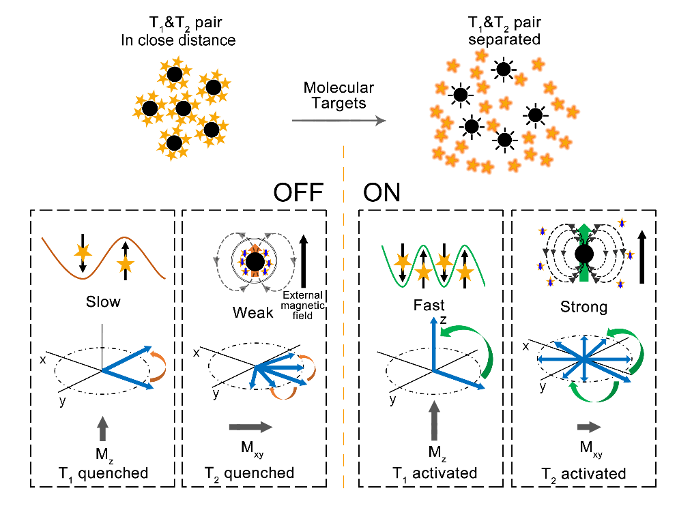Physic Professor and Graduate Student Publish Paper on New Imaging Method for Early Cancer Detection
One of the most important steps in the fight against cancer is the early detection of tumors in the body. Department of Physics professor and McDevitt chair Kai Liu and graduate student Zhijie (Hugh) Chen collaborated with colleagues at the University of California, Davis (UCD) to develop novel nanoscale magnetic probes for enhanced contrast in magnetic resonance imaging (MRI) that makes it easier to discover small tumors even in deep tissue. Their research was recently published in Nature Nanotechnology.
Major Research Instrumentation Enabled MRI study
Chen and Liu began conducting research on this project at UCD, and continued after they moved to Georgetown. The study looks at ways to drastically improve the magnetic resonance tuning (MRET) technology currently in use, which is based on a distance-dependent phenomenon that occurs between two nanoscale magnetic elements inside the nanoprobes to generate signals for MRI.

Illustration of the enhancement mechanism (T1 and T2 quenching and recovery) of the TMRET nanoprobe. Credit: Xiangdong Xue (UCD) and Zhijie Chen (GU).
Up until this point, the MRET technology only used nanoprobes where the responsiveness of one of the components is modulated, which is already beneficial for MRI but the imaging of the potentially cancerous growths still has limited sensitivity. Chen and Liu were part of a team, led by Yuanpei Li, a professor at UCD, that created a novel probe to generate two-way magnetic resonance tuning (TMRET). The responsiveness of both elements in the nanoprobes are suppressed until they reach the target, where contrast mechanisms based on both elements are turned on.
Chen led the study on the magnetic behaviors of the nanoprobes, along with colleagues from UCD and the University of Tennessee, which eventually shed light on the mechanisms responsible for the enhancement effect.
In laboratory tests, the TMRET method detected early-stage brain tumors with greatly increased sensitivity. This will provide “new opportunities for molecular diagnostics and image-guided biomedical applications,” according to the article.
“This is an exciting study showing that nanostructured magnetic materials could be used in a smart way to bring out new functionalities, in this case, new imaging contrast mechanisms that can be used for MRI in aiding detection of small, early-stage cancer,” Liu says. “It is a great example of how advances in fundamental physics and materials science can have broad impacts in biomedical research”, says physics Department Chair Jeffrey Urbach.
Chen and Liu’s research at Georgetown University was supported by the National Science Foundation (NSF-ECCS), and enabled by a recently acquired Magnetic Property Measurement System (MPMS3) through a NSF Major Research Instrumentation grant. The system provided extreme sensitivity, a wide magnetic field range and temperature span, and versatile operation modes that were critical for the magnetic characterizations of the nanoprobes.
About Chen and Liu
Chen received his B.S. in physics from Purdue University in 2014 and M.S. in experimental condensed matter physics from UC Davis in 2017. He is currently a PhD candidate working in Prof. Kai Liu’s group at Georgetown University. His research interests include novel spin structures, magnetic nanoparticle systems, 2D material heterostructures and Majorana fermions. He has co-authored several papers in high-impact journals such as Science, Nature Nanotechnology, Nano Letters, and PNAS.
Liu’s research focuses on synthesis and experimental investigation of nanostructured materials, particularly in nanomagnetism and spintronics. He was a recipient of an Alfred P. Sloan Research Fellowship (2005) and a UC Davis Chancellor’s Fellowship (2007). He is an elected Fellow of the Institute of Physics (UK, 2011), American Physical Society (2012), IEEE (2016), and AAAS (2019). He served as the General Chair for the 2016 Annual Conference on Magnetism and Magnetic Materials (MMM) in New Orleans, and an Associate Editor for APL Materials. He is currently the Secretary for the International Union of Pure and Applied Physics (IUPAP) Commission on Magnetism (2018-2020).
